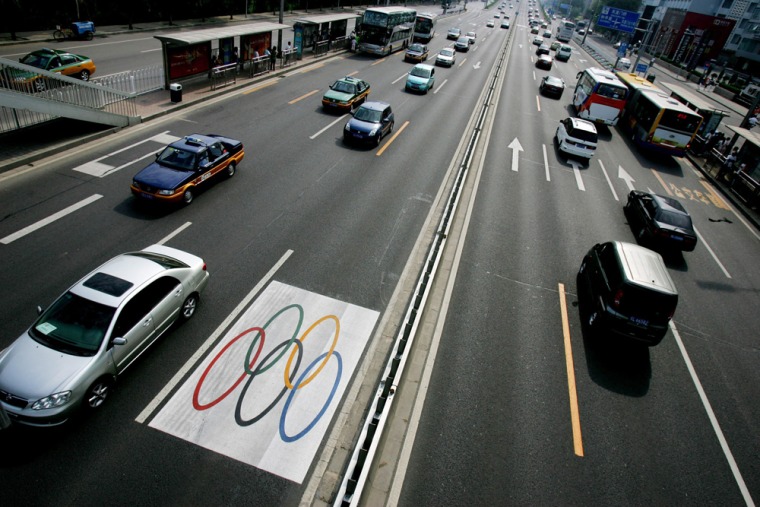Beijing started its most drastic pollution-control plan Sunday, restricting car use and limiting factory emissions in a last-minute push to clear smog-choked skies for the August Olympics.
Under the two-month plan, half of Beijing's 3.3 million cars will be removed from city streets on alternate days, depending on whether the license plate ends in an odd or even number.
Skies were relatively clear Sunday and traffic was light. But the real test will come when the work week begins.
To further ease traffic, employers have been asked to stagger work schedules and public institutions will open an hour later than normal.
Two new subway lines and an airport rail link should also bring relief to clogged roads. All three lines opened Saturday — a month behind schedule.
"It's much faster than a taxi, so it's very good," said Ola Tunamder, who arrived Sunday from Helsinki, Finland, and took the airport train into the city.
Factories ordered to cut emissions
In addition to the traffic plan, chemical plants, power stations and foundries have to cut emissions by 30 percent beginning Sunday. Dust-spewing construction in the capital was to stop entirely.
While the government has said it hopes to reduce vehicle emissions, one of the city's chief sources of pollution, it is unclear how the effectiveness of the plan will be gauged. The government has not made public a specific target for emissions levels or said how it will measure air quality.
Despite striking venues and $40 billion spent on improving infrastructure, keeping the city's air clean for the world's greatest athletes participating in the Aug. 8-24 games has been China's greatest challenge.
Many competitors are choosing to train away from Beijing. and International Olympic Committee President Jacques Rogge has said outdoor endurance events lasting more than an hour will be postponed if air quality if poor.
The world's greatest distance runner, Haile Gebrselassie of Ethiopia, has decided not to run the marathon event because the city's pollution irritates his breathing.
Already, 300,000 heavily polluting vehicles — aging industrial trucks, many of which operate only at night — were banned beginning July 1.
And on July 25, special Olympic traffic lanes will begin operating and will stay in place until Sept. 25. The city will set aside 165 miles of roadway on which certified Olympic vehicles will be allowed to move from hotels, Olympic venues and the Athletes' Village. The average speed is expected to be 35 miles per hour.
Experts say the pollution-curbing experiment could still go wrong because unpredictable winds could blow pollution into Beijing despite factory shutdowns in the city and five surrounding provinces.
Or it could go the other way, with August generally being the month with little wind, potentially allowing pollution to build up.
